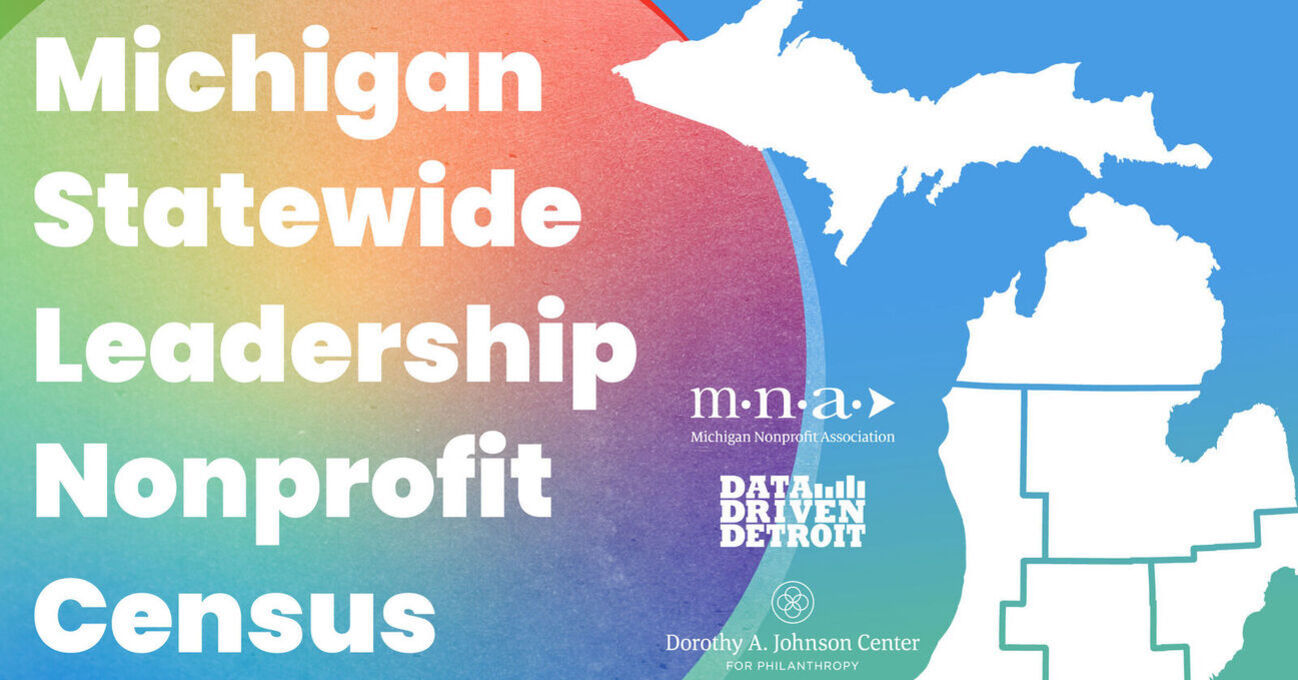
Michigan Statewide Nonprofit Leadership Census

December 8, 2022
New Report Highlights Racial Leadership Gap Among Michigan’s Nonprofits
LANSING- Michigan Nonprofit Association (MNA) in partnership with Data Driven Detroit (D3) and the Dorothy A. Johnson Center for Philanthropy today released the results of a collaborative, first-of-its-kind report that highlights the nonprofit racial leadership gap across Michigan.
The Michigan Statewide Nonprofit Leadership Census identifies the percentage of BIPOC (Black, Indigenous, and People of Color) nonprofit leaders statewide to provide a clear understanding of the racial and ethnic composition of staff members and boards at nonprofits statewide. The report which identifies equity issues facing different communities across the state-- focused on six regions in Michigan: Lakeshore/West Michigan, Metro Detroit, Mid-State/Central Michigan, Southern Central Michigan, Tip of the Mitt, and the Upper Peninsula. “We prioritized data equity for this report,” said Nellie Tsai, social innovation officer at MNA. “Community stakeholders were involved in the entire process from the survey design to the outreach. We intentionally shared the survey analysis with the respondents first to get their feedback and to ensure that our interpretation matched their expectations, understanding that this was their information we were presenting."
Read the Full Press Release Here.
Statewide Report Captures the First Ever Comprehensive Dataset on Nonprofit Leadership in Michigan.
Michigan Nonprofit Association — in partnership with Data Driven Detroit (D3) and the Dorothy A. Johnson Center for Philanthropy — has captured the first comprehensive dataset about the demographics of nonprofit leadership throughout Michigan. This project is supported with funding from the Charles Stewart Mott Foundation.
The project collected staff and board demographic information, resource and equity-related data from participants.
The first phase of this project – the Detroit Nonprofit Leadership Census survey – was conducted in February 2021. The survey’s results constitute the first-ever detailed dataset about the demographics of Detroit nonprofit leaders, board members, and staff, as well as their connections with local funders.
Survey & Report Introduction
This report presents findings from Michigan Statewide Nonprofit Leadership Census, a survey collaboratively conducted by Data Driven Detroit (D3), The Dorothy A. Johnson Center for Philanthropy at Grand Valley State University, and Michigan Nonprofit Association (MNA) through Spring 2022.
Pushing forward from the research progress made by the Detroit Nonprofit Leadership Census , this survey aims to build the first detailed dataset about the demographics of nonprofit leaders, board members, and staff, as well as their connections with the funders in Michigan.
This report identifies BIPOC leaders (who are Black, Indigenous, or People of Color) in the state, to provide a better understanding of the racial and ethnic composition of staff and boards at nonprofit organizations, and facilitate the additional connection between, and support for, these organizations.
It also identifies equity issues facing different communities across the state, as the issues facing residents of the Upper Peninsula might differ from those in Metro Detroit.
This report presents the key findings by first revealing common trends by topic at the state level, and highlighting particular trends that stand out at the regional level. The six regions that this report focuses on are: the Upper Peninsula, Tip of the Mitt, Mid-Central Michigan, Lakeshore/West Michigan, Southern Central Michigan, and Metro Detroit. At the end of the report, there are more details provided for each of the regions to help guide community-level conversations and understanding.
The sections in this report are:
- Key Takeaways
- Our Process
- Key Findings: Leadership and Staff Composition
- Key Findings: Organizational Characteristics
- Interactive Tool: Network Map
- Get Engaged!
2022 Nonprofit Leadership Census – Full Report
To be added to a BIPOC-led nonprofit directory click here.
Regional Reports
Lakeshore/West Michigan
This is a regional report that focuses on the Lakeshore/West Michigan area, as a part of the Michigan Statewide Nonprofit Leadership Census . The regional report aims to highlight key findings specific to the leaders, board members, and staff of nonprofits in Lakeshore/West Michigan, as well as their connections with funders. This report identifies BIPOC leaders (who are Black, Indigenous, or a Person of Color) in the region, to provide a better understanding of the racial and ethnic composition of staff and boards at nonprofit organizations, and facilitate the additional connection between, and support for, these organizations.
Metro Detroit
This is a regional report that focuses on the Metro Detriot area, as a part of the Michigan Statewide Nonprofit Leadership Census . The regional report aims to highlight key findings specific to the leaders, board members, and staff of nonprofits in Lakeshore/West Michigan, as well as their connections with funders. This report identifies BIPOC leaders (who are Black, Indigenous, or a Person of Color) in the region, to provide a better understanding of the racial and ethnic composition of staff and boards at nonprofit organizations, and facilitate the additional connection between, and support for, these organizations.
Mid-State/Central Michigan
This is a regional report that focuses on the Mid-State/Central area, as a part of the Michigan Statewide Nonprofit Leadership Census . The regional report aims to highlight key findings specific to the leaders, board members, and staff of nonprofits in the Mid-State/Central, as well as their connections with funders. This report identifies BIPOC leaders (who are Black, Indigenous, or a Person of Color) in the region, to provide a better understanding of the racial and ethnic composition of staff and boards at nonprofit organizations, and facilitate the additional connection between, and support for, these organizations.
Southern Central Michigan
This is a regional report that focuses on Southern Central Michigan area, as a part of the Michigan Statewide Nonprofit Leadership Census . The regional report aims to highlight key findings specific to the leaders, board members, and staff of nonprofits in Southern Central Michigan, as well as their connections with funders. This report identifies BIPOC leaders (who are Black, Indigenous, or a Person of Color) in the region, to provide a better understanding of the racial and ethnic composition of staff and boards at nonprofit organizations, and facilitate the additional connection between, and support for, these organizations.
Tip of the Mitt
This is a regional report that focuses on the Tipe of the Mitt area, as a part of the Michigan Statewide Nonprofit Leadership Census . The regional report aims to highlight key findings specific to the leaders, board members, and staff of nonprofits in Southern Central Michigan, as well as their connections with funders. This report identifies BIPOC leaders (who are Black, Indigenous, or a Person of Color) in the region, to provide a better understanding of the racial and ethnic composition of staff and boards at nonprofit organizations, and facilitate the additional connection between, and support for, these organizations.
the Upper Peninsula
This is a regional report that focuses on the Upper Peninsula area, as a part of the Michigan Statewide Nonprofit Leadership Census . The regional report aims to highlight key findings specific to the leaders, board members, and staff of nonprofits in the Upper Peninsula, as well as their connections with funders. This report identifies BIPOC leaders (who are Black, Indigenous, or a Person of Color) in the region, to provide a better understanding of the racial and ethnic composition of staff and boards at nonprofit organizations, and facilitate the additional connection between, and support for, these organizations.